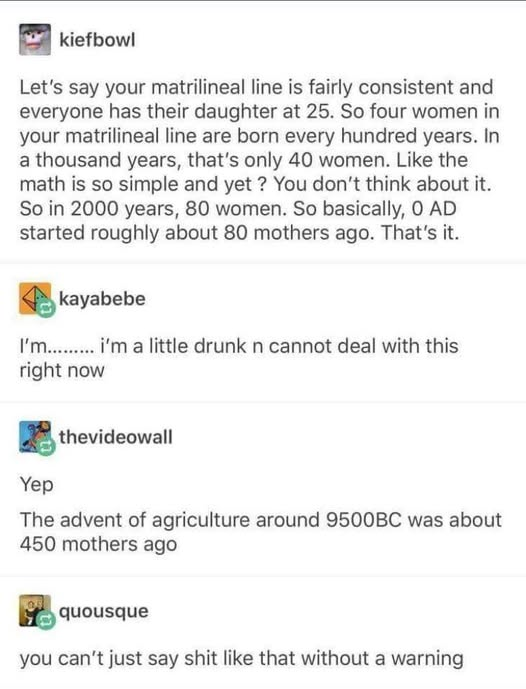this post was submitted on 23 Jan 2025
893 points (98.6% liked)
Science Memes
11671 readers
1211 users here now
Welcome to c/science_memes @ Mander.xyz!
A place for majestic STEMLORD peacocking, as well as memes about the realities of working in a lab.

Rules
- Don't throw mud. Behave like an intellectual and remember the human.
- Keep it rooted (on topic).
- No spam.
- Infographics welcome, get schooled.
This is a science community. We use the Dawkins definition of meme.
Research Committee
Other Mander Communities
Science and Research
Biology and Life Sciences
- [email protected]
- [email protected]
- [email protected]
- [email protected]
- [email protected]
- [email protected]
- [email protected]
- [email protected]
- [email protected]
- [email protected]
- [email protected]
- [email protected]
- [email protected]
- [email protected]
- [email protected]
- [email protected]
- [email protected]
- [email protected]
- [email protected]
- [email protected]
- [email protected]
- [email protected]
- [email protected]
- [email protected]
- !reptiles and [email protected]
Physical Sciences
- [email protected]
- [email protected]
- [email protected]
- [email protected]
- [email protected]
- [email protected]
- [email protected]
- [email protected]
- [email protected]
Humanities and Social Sciences
Practical and Applied Sciences
- !exercise-and [email protected]
- [email protected]
- !self [email protected]
- [email protected]
- [email protected]
- [email protected]
Memes
Miscellaneous
founded 2 years ago
MODERATORS
you are viewing a single comment's thread
view the rest of the comments
view the rest of the comments

https://www.openaccessgovernment.org/average-age-of-conception-throughout-human-history/151423/ nah it's pretty much been the average age of mothers for a very very long time indeed
So from your article, it seems to say the opposite
The female average age of conception is 23.2, AND this includes a recent rise, so it would be even lower than that when considering older times
Also, it's unclear if the average also accounts for the fact that there is are significantly more child being given birth to in the very recent past, which would skew the number way up
Every time I see people argue this I always wanna ask, are you considering that people don't stop having kids after 1 or 2? I'd wager that most women had the majority of their kids around that 23ish mark when you include that lady who had 10 kids from 15 to 35
I don't think 23 is wildly off from 25, and honestly this is just the first one I found that mentions it, I've seen various different sources for different reasons in the past. But the average is based on genetic mutations, and obviously in any given human it's irrelevant how large a generation is as to how much genetic mutation is contributed by the generation. Like even if there are 8 billion people today, that doesn't imply that you somehow got more generic inheritance from your parents than they did from theirs back when there were 6 billion people or whatever. Judging average to be the average per generation (a reasonable inference given the methodology) the last few years won't make much of a difference in a timescale of 250k years
I can't find the article I vaguely remember from a while ago, here's another random one that has mothers in the bronze age ranging from 16-40ish https://www.researchgate.net/publication/314262257_Bronze_Age_Beginnings_The_Conceptualization_of_Motherhood_in_Prehistoric_Europe although you can't really infer much about averages from that.
Anyway yeah there have been periods in time when average age of mothers was younger, but generally if you look back on a long timescale it's been older than people seem to assume. Seems to be quite common to have the notion that women all had children at 16 or whatever back in the day but not much to really bear that out that I can find.